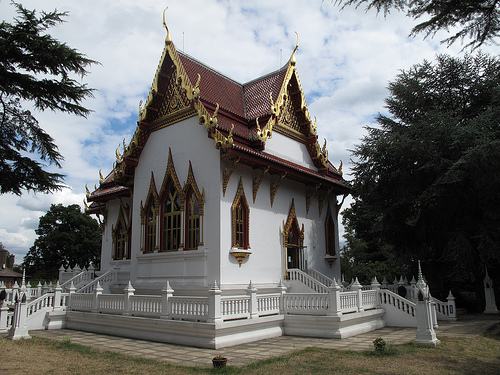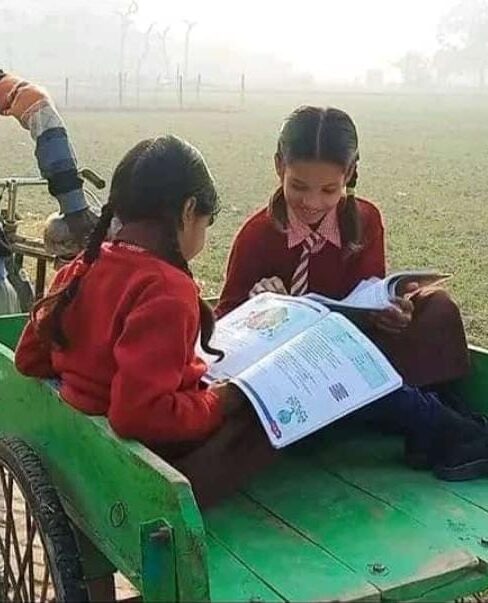
What I notice immediately—after the stifling heat, the humidity that fogs glass, the stray dogs—are the temples. They are part of the Thai landscape, like the rubber trees, the wild green jungles, the red mountains of the north. Each temple is unlike the other, constructed by the community’s money and faith and devotion. According to a count done in 2004, there are well over 40,000 Buddhist temples in Thailand, 40,000 temples in a country that can fit into Texas.
Faith comes easy here. You are born. You are Buddhist. Buddhism dictates the lives of the Thai people. They wear Buddha pendants around their necks. In most homes there is the huang phra, Buddha room. In the morning, he is served a shot glass of coffee and tiny portions of food. Sometimes fresh jasmine garlands circle his neck and arms. Mornings and evenings temples hum with chants, the air heavy with the scent flowered incense and honey-waxed candles. And monks! Monks are also everywhere. It is hard to miss a bald man in orange robes walking city streets. But this is not out of the ordinary. Here, monks follow tradition and stride in to the city or village each morning for food. Never asking, never begging. Alms bowl held humbly in front of them.
Imagine, then, a man and a woman, having lived for over thirty years in this Buddhist world, transplanted to Chicago, where the wind bruises their skin and the long city blocks spin them in confusion. It is 1972 when they meet, the Watergate scandal beginning, and their luck and fortune, their love goes unnoticed. They pray, yes, but they pray to the Buddha in their hearts, the temple they had created in their minds. The first few years are about loneliness, about how to find comfort in a land so alien. Where were they to go? What community were they to find?
My mother and father were part of the first wave of Thai immigrants in the US. They searched for others in the flat of Illinois, and in 1974 Wat Dhammaran was founded with the sole mission to create a place of worship and celebration for the growing Thai community. The first Thai temple in Chicago was on Hastings Avenue, a former Greek Orthodox Church, and for years, we prayed to a large Buddha in church pews. But the Thais reproduced—we were good at it—and the church couldn’t hold the amount of Thai kids running wildly in wild neon sneakers, with wild hair, and wild American tongues.
And so in 1984 the temple moved again, to a bigger home with several acres of land, a closed-down elementary school where stray cats raised kittens in abandoned desks and closets. The temple edged the southside suburb of Bridgeview, neighboring a truck yard and a neighborhood that didn’t want us there. This was to be our new home, a work-in-progress, an adjustment.
Some nights, dynamite exploded asphalt. Some nights, stones cracked windows. Some nights, eggs stained brick. Some nights, expletives echoed like gunshots. And gunshots. They were there too. And suddenly fear. Fear in a place of supposed safety. Fear in a place that housed the spirit. Fear in a place of worship.
But this was home. For now. This foreign place, this incomprehensible world.
Vigilantly, we returned week after week. Month after month. Year after year. And soon, we belonged, though our fences were tall and our security cameras sharp. And soon, our temple was no longer the target of animosity.
This was the Buddhism I understood. This Thai American Buddhism. This Thai American Chicagoan Buddhism. This Buddhism is what I return to in my writing. Faith with one eye open.
I knew this temple, knew the hiding spots. Knew the secret hole in the fence that I crawled through to ditch another sermon about suffering. Knew the undulations of the fields where my classmates and I played football—not soccer—after classes, pretending to be the Chicago Bears. Our temple wasn’t only a place to worship, but a Thai dance academy, a karate and kickboxing dojo. Our temple was not jeweled structures like in Thailand. Our temple had chalkboards, a ping-pong table frequented by monks, modern vending machines. Buddha resided in a gymnasium.
Here, our monks did not travel the streets for food. Who would give them any? We made sure to feed them each day. Our monks liked Big Macs.
On my birthdays, we often took a van full of monks to the Old Country Buffet. The restaurant served a variety of soups and dishes like mac and cheese, mashed potatoes, chicken wings, beans, greens, and peas. It was a cornucopia of bland American cuisine. The monks loved it. When younger, my Buddhism was a source of embarrassment because, as I followed the long line of monks, at OCB, I felt the eyes of the patrons on us, on me. White, old, judging.
On OCB day, my birthday, the monks came with their appetites. The older ones asked if I could get their food for them. “Chicken wing,” one would say. “Lots. Mashed potato. No vegetable.”
At the buffet, the other patrons stared while the group of monks dished food onto their plates. I made sure to load mine with wings and mashed potatoes. I filled a soup bowl with lumpy gravy. Inevitably, someone asked the question, usually an older gentleman with a VFW hat and flannel even though it was summer.
“Who are you?”
“Pardon?” I tried never to meet eyes.
“Who are you?” he asked again.
I wanted to tell him, “I am one of you. I’m not with them.” Instead I said, “You mean them? They’re monks. Thai monks.”
“Why are they here?” he said gruffly.
“It’s my birthday.”
This was my Buddhism, this awkwardness, this confusion, this humor and solemnity, this way of life. When my mother and father decided to move to America, Buddhism had changed for them. From majority to minority. From comfort to moments of unease. Buddha said: “Nothing remains unchanged.” As a writer, as an immigrant son, it is this change I try to understand, this Chicago Buddhism, which could be as rough the winter weather. It is this sacrifice I try to understand, of a people far from their native home. What remains the same, through all of this, is Buddha’s face, still, serene, eyes half open about to wake from a pleasant dream.
Ira Sukrungruang is the author of the memoir Talk Thai: The Adventures of Buddhist Boy, the poetry collection In Thailand It is Night, and coeditor of two anthologies: What Are You Looking At? The First Fat Fiction Anthology and Scoot Over, Skinny: The Fat Nonfiction Anthology.
Photo by Flickr Creative Commons user by duncan c




